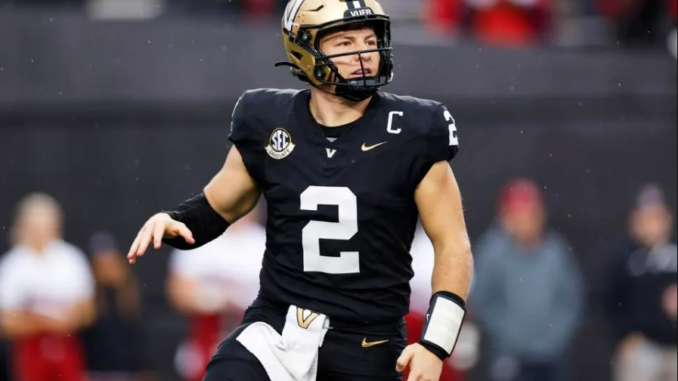
Diego Pavia transformed from a relatively unknown transfer to a college football sensation in early October when he led Vanderbilt to a stunning upset over then-number-one-ranked Alabama. He amassed over 300 total yards and threw for two touchdowns in the game. This victory marked a historic moment for the Vanderbilt football program, which had never defeated a top-5 team in 60 attempts and hadn’t triumphed over Alabama in 40 years. In celebration, Vanderbilt students celebrated by tearing down the goalpost and tossing it into the Cumberland River.
Just a month later, Pavia took a bold step by suing the NCAA, claiming that its eligibility rules for junior college transfers violate antitrust laws. What an impressive follow-up!
Pavia has joined the ranks of notable NCAA figures like Reggie Bush, Denard Robinson, and Mario Chalmers—not for his on-field accomplishments, which, while commendable, do not quite match those of these legends, but because he is involved in an active antitrust lawsuit against the NCAA. He is the latest addition to a growing number of current and former athletes taking legal action against the governing body of college sports, and he likely won’t be the last. Importantly, Pavia’s case falls outside the scope of the historic House settlement, which permits NIL payments from schools to athletes and modifies many NCAA regulations, but does not alter the junior college transfer eligibility rules.
The lawsuit has already seen some notable procedural developments. Unlike typical lawsuits that seek financial compensation, Pavia is requesting a temporary restraining order (and ultimately an injunction) to prevent the NCAA from enforcing its eligibility rules, allowing him to play an extra season after this year. An injunction is a court order that prohibits a party from engaging in specific actions—in this case, stopping the NCAA from applying its rules. The temporary restraining order, which functions similarly to a preliminary injunction, is expedited to address situations where waiting for a full trial would render the case irrelevant, such as when Pavia runs out of eligibility before the trial can occur. On November 12th, U.S. District Judge William L. Campbell Jr. denied Pavia’s request for the temporary restraining order, but a hearing is scheduled for December 4th, just days before the transfer portal opens on December 9th.
At the heart of the lawsuit is the argument that the NCAA’s restrictions on junior college (JUCO) transfers hinder their ability to earn NIL income. Pavia’s lawyers present compelling points about the unequal treatment of JUCO transfers compared to other athletes entering four-year institutions under NCAA guidelines. Typically, NCAA athletes have five years to compete in four seasons if they enroll directly after high school. Pavia’s attorneys highlight that other paths to NCAA eligibility do not incur the same reductions in eligibility years imposed on JUCO transfers.
For instance, an athlete can graduate high school and attend a prep school football program for a year without affecting their eligibility at the NCAA level. Prep school recruits play a significant role in college football recruiting, with IMG Academy being one of the most recognized prep football institutions in the country.
Pavia’s lawyers referenced the illustrious Chris Weinke in their argument. Weinke was selected in the second round of the 1990 MLB draft by the Toronto Blue Jays and spent six years in professional baseball, reaching as high as triple-A, though he never made it to the major leagues. At the age of 25, he enrolled at Florida State University as a freshman and played four seasons of football, during which he won a national championship and earned a Heisman trophy. Remarkably, he was 28 years old when he won the Heisman, making him the oldest player to receive the award.
The differing treatment of junior college (JUCO) transfers compared to other students who postpone enrollment at a four-year institution is designed to weaken any claims that the rule offers pro-competitive benefits that could balance its anti-competitive consequences—a crucial aspect of antitrust evaluation.
In the lawsuit, Pavia’s attorneys stress the significance of each game in maximizing a player’s NIL earnings. A notable quote references Pavia’s outstanding performance against Alabama, stating, “National television broadcasts offer considerable exposure for college athletes. One game can elevate a college athlete from a local favorite to a household name.” They also point out the extremely narrow margins that can influence a player’s draft position and, consequently, their future earnings in the sport.
Recently, the NCAA has experienced some favorable developments. They might be on the verge of addressing one of their most pressing antitrust issues (limits on NIL compensation) if a settlement in the House progresses, a possibility that appears more promising than it did a few weeks ago. Additionally, they likely received support from the American public, as Republicans—who are generally more sympathetic to the NCAA and less favorable to organized labor—won several key elections. Nevertheless, this lawsuit highlights that many of the NCAA’s regulations are vulnerable to antitrust challenges, and there is a growing list of individuals willing to partake in class-action lawsuits.

Leave a Reply